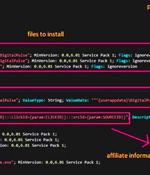Security News

Vc, a relatively new ransomware / cyber extortion group, claims to have hacked Sony and made off with valuable data. "We have successfully compromissed all of sony systems. We wont ransom them! we will sell the data. due to sony not wanting to pay. DATA IS FOR SALE," the group wrote on their leak site on Sunday.

Credit reporting firm TransUnion has denied claims of a security breach after a threat actor known as USDoD leaked data allegedly stolen from the company's network. "At this time, we and our internal and external experts have found no indication that TransUnion systems have been breached or that data has been exfiltrated from our environment."

Remember last November, when hackers broke into the network for LastPass-a password database-and stole password vaults with both encrypted and plaintext data for over 25 million users? Well, they're now using that data break into crypto wallets and drain them: $35 million and counting, all going into a single wallet.

In an undated note seen by TechCrunch, the unnamed hackers described how they found and exploited several security vulnerabilities that allowed them to compromise WebDetetive's servers and access its user databases. By exploiting other flaws in the spyware maker's web dashboard-used by abusers to access the stolen phone data of their victims-the hackers said they enumerated and downloaded every dashboard record, including every customer's email address.

Network monitoring company LogicMonitor confirmed today that certain customers of its SaaS platform have fallen victim to cyberattacks linked to ransomware. While LogicMonitor did not confirm that ransomware attacks hit its affected customers, anonymous sources familiar with the incidents told BleepingComputer that the threat actors hacked customer accounts and "Were able to create local accounts and deploy ransomware."

Suspected Chinese hackers disproportionately targeted and breached government and government-linked organizations worldwide in recent attacks targeting a Barracuda Email Security Gateway zero-day, with a focus on entities across the Americas. Barracuda warned customers that the vulnerability was being exploited to breach ESG appliances on May 20, when it also patched all vulnerable devices remotely.

The Federal Bureau of Investigation warned that patches for a critical Barracuda Email Security Gateway remote command injection flaw are "Ineffective," and patched appliances are still being compromised in ongoing attacks. Even though the Barracuda patched all appliances remotely and blocked the attackers' access to the breached devices on May 20, one day after the bug was identified, it also warned all customers on June 7 that they must replace all impacted appliances immediately, likely because it couldn't ensure the complete removal of malware deployed in the attacks.

Threat actors are leveraging access to malware-infected Windows and macOS machines to deliver a proxy server application and use them as exit nodes to reroute proxy requests. According to AT&T Alien Labs, the unnamed company that offers the proxy service operates more than 400,000 proxy exit nodes, although it's not immediately clear how many of them were co-opted by malware installed on infected machines without user knowledge and interaction.

The UK Electoral Commission discovered last year that it was hacked the year before. That's fourteen months between the hack and the discovery.

Nearly 2,000 Citrix NetScaler instances have been compromised with a backdoor by weaponizing a recently disclosed critical security vulnerability as part of a large-scale attack. CVE-2023-3519 refers to a critical code injection vulnerability impacting NetScaler ADC and Gateway servers that could lead to unauthenticated remote code execution.